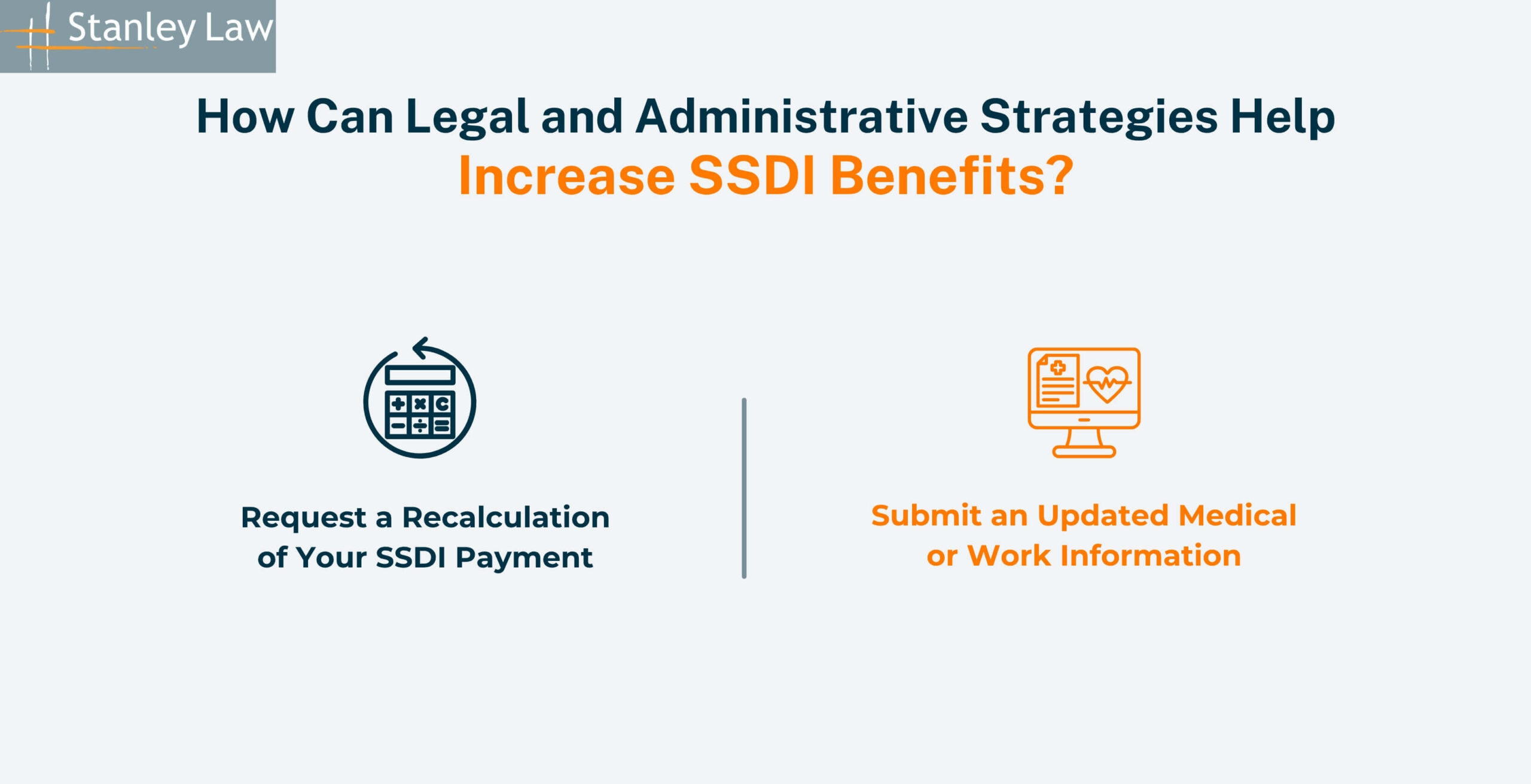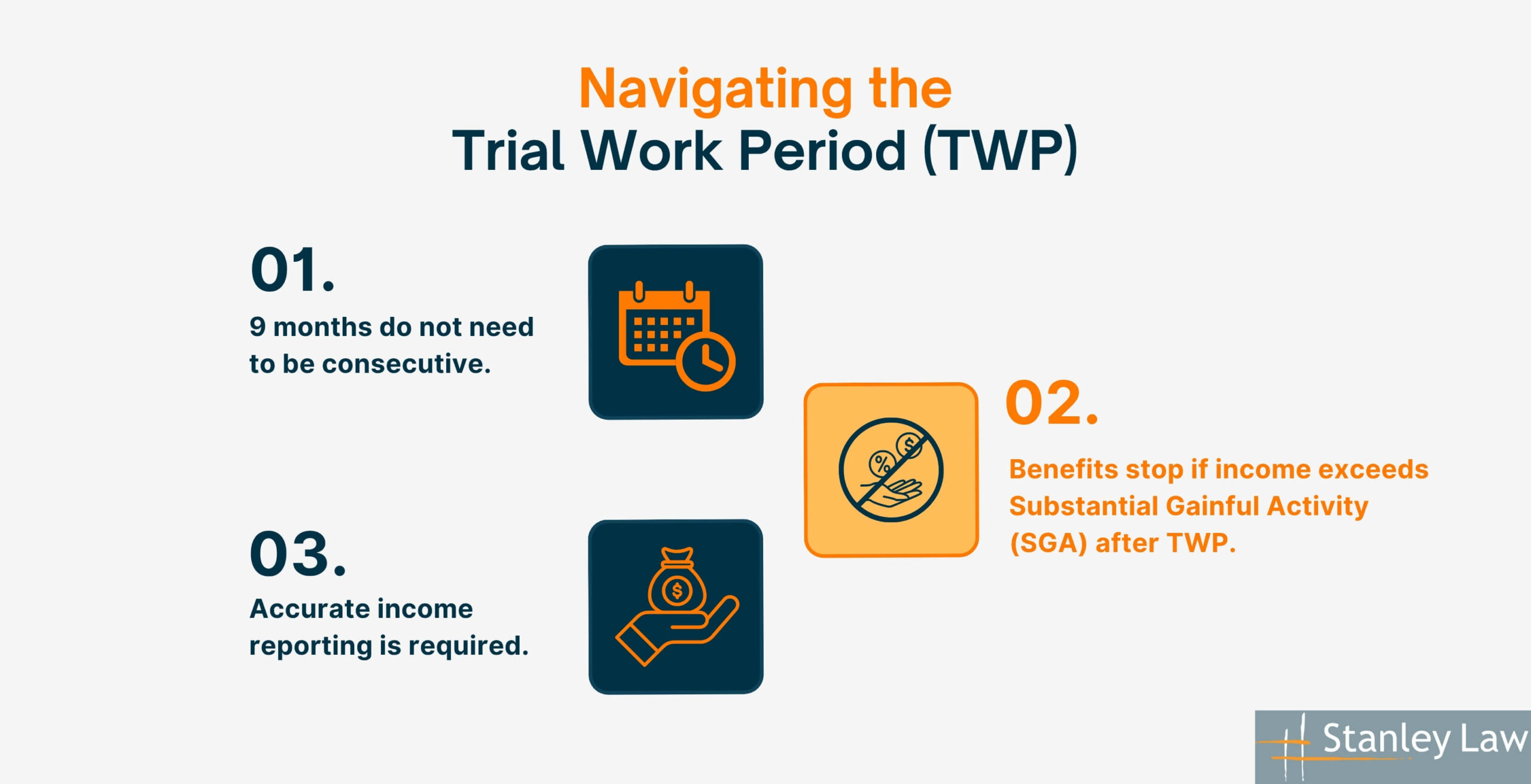Social Security Disability Insurance (SSDI) provides vital financial support to individuals who can no longer work due to a qualifying medical condition. However, many eligible recipients do not realize they may be receiving much less than they are entitled to earn, often due to missed credits, incomplete records, or overlooked benefit options. And sometimes this shortchanging has been going on for years, costing them tens of thousands of dollars in funds to put toward both essential and discretionary expenditures.
Understanding what factors affect your monthly SSDI payment is the first step toward maximizing it. At Stanley Law Offices, we help individuals and families across Upstate New York and Northern Pennsylvania navigate the system and increase their SSDI payments through knowledgeable, personalized support.
How Can Legal and Administrative Strategies Help Increase SSDI Benefits?
SSDI payments increase when you correct inaccurate income records, update old medical evidence, or reopen improperly calculated claims. Legal help resolves these problems through Social Security Administration reconsiderations, appeals, and the reopening of cases.
Request a Recalculation of Your SSDI Payment
A recalculation of your SSDI payment is appropriate if your earnings record with the SSA contains errors, such as missing years of income. You obtain your earnings statement directly from the SSA to verify its accuracy.
An experienced SSDI lawyer helps you file for a correction or reconsideration if disagreement exists. For instance, unreported or misreported self-employment income can lower your benefit. A skilled New York SSDI attorney can review your prior submissions to the state of New York and ensure your earnings record is corrected.
Submit an Updated Medical or Work Information
Submitting new medical evidence often increases your SSDI benefit, particularly if your disabling condition worsens. A significant decline in your health justifies a case reopening and a re-evaluation of your payment amount.
Legal guidance is crucial when submitting new medical information. An attorney will double-check all entries to ensure your documents support a successful re-evaluation.

How Does COLA Affect Your SSDI Payments?
Cost-of-Living Adjustments (COLA) are annual increases to SSDI benefits to prevent inflation. The SSA calculates COLA based on the Consumer Price Index for Urban Wage Earners and Clerical Workers (CPI-W). This adjustment ensures your benefit’s purchasing power remains stable over time.
COLA increases apply automatically each January, so you do not need to reapply. If you suspect your COLA has been missed, you can check your benefit statements or contact the SSA.
Our team helps Upstate New York and Northern Pennsylvania residents confirm whether their COLA increases were applied.

How Does the SSA Calculate SSDI Payments?
SSDI payment amounts are based on your PIA (Primary Insurance Amount), which is calculated from your Average Indexed Monthly Earnings (AIME). AIME reflects your 35 highest-earning years, adjusted for wage growth.
SSA formulas favor lower-income workers in NY and PA by replacing a higher percentage of their income. COLA and the disability freeze provision also influence the final amount.
For individuals with limited income or assets, it’s also worth exploring whether you can receive both SSDI and SSI benefits together, as eligibility for concurrent benefits can provide additional financial support.
What Is the Disability Freeze and How Does It Increase SSDI Payments?
A disability freeze is an SSA provision that protects your SSDI benefit amount. The SSA “freezes” or excludes years from your earnings record where your disability significantly reduced or eliminated your income. This action is crucial for your benefit calculation.
This freeze preserves a higher Average Indexed Monthly Earnings (AIME) by excluding low-earning years due to disability. The disability freeze is typically automatic for approved SSDI recipients in New York and Pennsylvania. If SSA fails to apply it, your AIME may decrease, and reduce your SSDI benefit. An SSDI attorney can help fix these errors and restore the full amount.
Filing Strategies and Timing Considerations
When and how you apply for SSDI affects your benefit. Work credits, income history, and back pay are all influenced by timing. Making these decisions with legal insight results in a higher award.
Can Delaying Your SSDI Application Lead to Higher Benefits?
Delaying your SSDI application may present an opportunity for higher benefits under specific circumstances. Waiting, if you are not yet fully disabled, allows more income years to count toward your Average Indexed Monthly Earnings.
This strategy is not suitable for individuals already qualified or those with severe disabilities. Delaying may reduce retroactive pay, creating a legal disadvantage.
Navigating the Trial Work Period (TWP)
The Trial Work Period allows nine months of work over five years without benefit loss.
Key Rules:
- The nine months do not need to be consecutive.
- Benefits continue unless earnings exceed Substantial Gainful Activity (SGA) after the TWP.
- You must notify the SSA of earnings during the TWP to prevent delays or benefit reductions.

When Should You Consult an SSDI Lawyer?
You should consult an SSDI lawyer when you suspect your benefits are lower than they ought to be. Common signs include low award letters, inaccurate back pay, or missing work credits. A review by a knowledgeable NY-based SSDI attorney will easily clarify your situation.
Lawyers assist by filing for reconsideration, requesting case reopenings with new evidence, or ensuring accurate back pay. At Stanley Law Offices, we provide these services for individuals throughout our primary service area of Upstate New York and Northern Pennsylvania, helping you secure the correct SSDI payments.
Are You Eligible for Spousal or Ex-Spousal SSDI Benefits?
You are eligible for spousal SSDI benefits if you are at least 62 years old and your current or former spouse (marriage lasting 10+ years and you are currently unmarried) is entitled to SSDI or retirement benefits. You receive either your benefit or the spousal amount, whichever is higher, not both.
To file for this benefit type, you would provide your marriage certificate, your spouse’s or ex-spouse’s Social Security number, and your own SSA number. The process ensures you receive the maximum benefit available based on your marital history. Our attorneys are skilled at laying out all the rules and guiding clients through this application process.
Can You Get SSDI Survivor Benefits?
Yes, SSDI survivor benefits are available to surviving spouses or divorced surviving spouses of deceased workers who are qualified for SSDI. Payments typically begin when the survivor reaches age 60, or age 50 if the survivor is disabled. This provides crucial financial support after a loss.
Surviving spouses can switch from their own SSDI benefit to the survivor amount if the survivor benefit is higher. The application process involves submitting proof of death, marriage, and the deceased’s work history to the SSA. Stanley Law Offices legal staff is happy to assist with handling these sensitive claims.

Can Parents of Deceased SSDI Recipients Receive Benefits?
Biological or adoptive parents of a deceased adult child who received SSDI benefits are, in specific situations, eligible for parents’ benefits. This occurs if the deceased child provided at least half of the parents’ financial support. The parent must be 62 or older.
To qualify, you must prove dependency on the deceased child and demonstrate that the child had sufficient SSA contributions. While this is a rare scenario, it is an often-overlooked avenue for support. Our firm evaluates eligibility for these unique parent-based SSDI cases.
Apply for Child-in-Care Benefits
Child-in-care benefits apply to spouses of SSDI recipients who are caring for the recipient’s child under age 16 or for a child who became disabled before age 22. The caregiver spouse receives spousal benefits regardless of their age, while the child qualifies for dependent benefits.
This provision supports families where one spouse’s disability impacts household income and childcare responsibilities. You must file a separate application for these child-in-care spousal benefits. We help families in communities across Upstate New York and Northern Pennsylvania navigate this process.
How Can the SSA’s BEST Tool Help You Check Benefit Eligibility?
The SSA’s Benefit Eligibility Screening Tool (BEST) is an online questionnaire that helps you identify potential eligibility for various Social Security benefits in New York and Pennsylvania. Access the tool directly at the SSA.gov; it will guide you through a series of questions about your circumstances.
The BEST tool offers a preliminary screening; it does not calculate payment amounts, nor does it guarantee eligibility. We recommend you use it as an initial step. For a comprehensive eligibility review and advice specific to your situation, consult our experienced SSDI lawyer.

FAQs About Increasing SSDI Payments
What is the 5-year rule for Disability?
You must have worked at least 5 of the last 10 years before becoming disabled. This confirms recent SSA contributions.
How do I get extra money from Social Security Disability?
You increase your benefit by submitting updated medical records, correcting income errors, or applying for family-based benefits.
What if my Disability check is not enough?
Review your earnings record for errors. You may qualify for SSI, housing support, or food assistance programs. We help you explore every possible source of support.
What other benefits can I get with SSDI?
You qualify for Medicare after 24 months, and your spouse or children receive dependent benefits. Other SSDI benefit programs include Extra Help for prescriptions and food or housing assistance.
What is the highest amount Social Security Disability Pays?
As of 2024, the maximum SSDI monthly benefit is $3,822. Your amount depends on your lifetime income record.
Need Help Maximizing Your SSDI Benefits?
Stanley Law Offices helped increase SSDI payments for clients, with office locations in Upstate New York and Northern Pennsylvania. Our attorneys verify records, correct SSA errors, and improve case outcomes.
Call 1-800-608-3333 for a free consultation. We will review your SSDI file, correct SSA errors, and file the right documents to help increase your benefits quickly and accurately.


